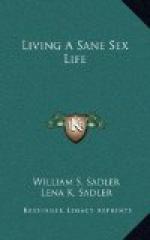But there is another phase in the sex life of human beings, which is entirely different from that of all other animals, and which must therefore be considered beyond all that needs to be said regarding the act of coitus for reproductive purposes only. This we are now ready to consider and study.
Now in all animals, except human beings, the act of coitus is only permitted by the female, (it would seem is only possible for her) when the ovum is present in the womb and ready to be fertilized. At all other times, all female animals, except woman, are practically sexless. Their sexual organs are dormant, and nothing can arouse them to activity. Not only do they fail to show any desire for coitus, but if an attempt should be made to force it upon them, they would resist it to the utmost of their strength.
But when the ovum is present in the womb, these same female animals are beside themselves with desire for coitus. They are then spoken of as “in heat.” And until they are satisfied, by meeting the male and procuring from him the vitalizing fluid which will fertilize their infertile ovum; or, failing in this, until the ovum passes away from them, out of the womb, they know no rest. At such times they will run all risks, incur all sorts of danger, do every possible thing to secure pregnancy. The thousand-and-one ways which female animals use to make known to their male mates their sexual desire and needs, when in heat, is a most interesting and wonderful story, a record made up of facts which would be well worth any student’s knowing. But as all such knowledge can readily be procured from books which are within the reach of all, there is no need of noting the data here.
But now, in woman, all these things are different! As a matter of fact, the presence of the ovum in the womb of a normally made woman makes little, and, in many cases, no difference whatever as regards her status concerning the act of coitus! That is, women are never “in heat,” in the same sense in which other female animals are. To be sure, in some cases, though they are rare, some women are conscious of a greater desire for coitus just after the ceasing of the menstrual flow; that is, when the ovum is in the womb. But such cases are so infrequent that they may well be counted atavistic, that is, of the nature of a tendency to return to a previous merely animal condition. For the most part, it is true of all normal women that the presence of the ovum in the womb makes little difference, one way or another, in regard to their desire for, or aversion to, the act of coitus.
Now the fact of this remarkable difference in the sex-status of women and the same quality in all other female animals leads us to a great number of interesting, not to say startling, conclusions, some of which are as follows:




